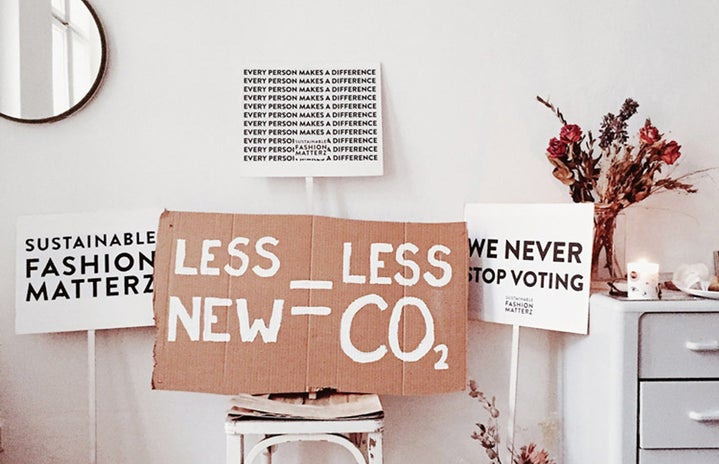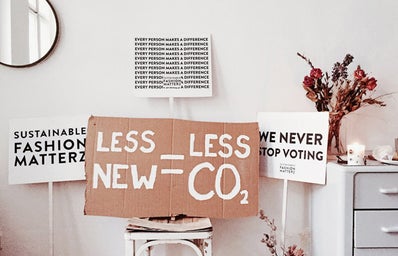Living on campus during the pandemic has been interesting, to say the least. Michigan State’s Live On program worked hard to achieve the possibility of students living on campus during the pandemic. While their efforts were successful, things look a bit different on campus this year. Something that I noticed particularly as a resident in Wilson Hall was how much more single-use plastic we have to use due to necessary sanitary mandates, especially in the dining halls. To combat this, I made a few small changes to my life that will end up saving tons of single-use plastic from going into landfills. While you can’t help some of it, there are still ways to reduce waste.
- Bring your own set of silverware to the dining halls.
-
Bringing your own set of silverware is a huge way to reduce plastic use. Silverware can’t always be recycled, so a lot of the time, it does just end up on the ground somewhere. If you were to bring your own set of silverware for three meals each day for a week, you would save twenty-one sets of silverware from going into the garbage. There are a lot of cool and inexpensive sets to purchase for travel, go to a thrift shop, or you could just steal a set from your kitchen at home. This is a super simple yet extremely beneficial change to make in your habits.
- Get a reusable water bottle.
-
Water bottles are another super easy way to reduce waste. In the dining halls, the drinks are now served in plastic cups due to the pandemic. While there are more choices in the dining halls, bringing your water bottle can help limit the amount of water cups used. Water bottles also don’t have to be expensive (hydroflasks are unnecessary, don’t worry). Even if you only have access to plastic water bottles, just reuse them!
- Find, make, or take a reusable bag.
-
Okay, I’m just kidding about the “take” part, but reusable bags are so convenient and so good for the environment. Also, how else are you going to carry in all of your amazing reusable products? Functionality is key with reusable bags in the dining hall, so make sure you get a medium or large bag with a flat bottom. If you’re crafty, you can also look up ways to make bags out of recycled materials, like sheets or old seed bags. They’re great for keeping as a sort of “go bag” for the dining hall so you’re never caught without what you need!
- Recycle in your dorm.
-
Recycling on campus can be tricky, but it doesn’t have to be. Now that recycling isn’t in the same room as the trash chute, a lot of students are confused about where to take their recycling. On the first floor of the dorm buildings, there are places to take most kinds of recyclables. I have the complementary mesh bag that Michigan State gave residents moving in hung up by my door for anything recyclable I bring home from the combos at Sparty’s or the dining hall. Recycling more would also mean using less trash bags!
- Ditch single-use masks.
-
Single-use masks are all over the ground around campus. While they’re convenient, they’re also largely wasteful. Animals have started being affected by the excess of masks in the environment, so switching to reusable masks could help significantly reduce the rapid influx of masks into the environment. Reusable masks may be a bit pricier than single-use masks, but they are an investment. Rather than paying multiple times for single-use masks, paying once for a reusable mask produces much less waste and provides you with a mask that won’t break or rip. Buying reusable masks is worth the impact for both your health and the environment.
- Order eco-friendly.
-
The dining hall can’t always satisfy student’s cravings, so ordering out is a go-to. During the pandemic, the amount of single-use products given with a meal has increased dramatically in order to combat COVID-19. On some delivery apps like DoorDash, there’s an option at checkout to opt out of receiving extra plastic, like silverware. This is another great and easy way to keep plastic out of the environment without having to do more than lifting a finger.
Living a sustainable life can sound really intimidating, especially if you take cancel culture and “wokeness” into account. Instead, think of living sustainably in baby steps. Making a lot of small changes helps the Earth just as much as someone who’s vegan or someone who runs their home with solar power. Our efforts do not cancel each other’s efforts out. Sustainability is also really difficult for people who fall under low socioeconomic status. Having little or no access to sustainable products and lifestyles can be really challenging; these are ways that are affordable and even free that occur in most on-campus students’ lives. Doing your part doesn’t have to be expensive — anything you can do is more than enough.


